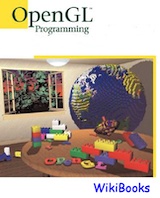
|
FreeComputerBooks.com
Links to Free Computer, Mathematics, Technical Books all over the World
|
|
- Title: OpenGL Programming
- Author(s): WikiBooks Contributors
- Publisher: WikiBooks; eBook (Creative Commons Licensed)
- License(s): Creative Commons License (CC)
- Hardcover/Paperback: N/A
- eBook: HTML and PDF
- Language: English
- ISBN-10/ASIN: N/A
- ISBN-13: N/A
- Share This:

|
OpenGL is an API used for drawing 3D graphics. OpenGL is not a programming language; an OpenGL application is typically written in C or C++. What OpenGL does allow you to do is draw attractive, realistic 3D graphics with minimal effort. The API is typically used to interact with a GPU, to achieve hardware-accelerated rendering.
This book presents definitive, comprehensive information on OpenGL 4.X, SPIR-V, OpenGL extensions, and the OpenGL Shading Language. It will serve you for as long as you write or maintain OpenGL code. It clearly explains OpenGL's newest APIs; key extensions; shaders; and essential, related concepts.
About the Authors- N/A
- Computer Graphics, 3D, Animation and Imaging
- Computer Vision and Machine Vision
- Computer and Video Game Development and Programming
- C++ Programming
- C Programming
 Similar Books:
Similar Books:
-
 Fundamentals of Computer Graphics with Java, OpenGL, JOGL
Fundamentals of Computer Graphics with Java, OpenGL, JOGL
Provides both step-by-step instruction on modern 3D graphics shader programming in OpenGL with Java and JOGL. It is appropriate both for computer science graphics courses and for professionals interested in mastering 3D graphics skills.
-
 Vulkan Tutorial (Alexander Overvoorde)
Vulkan Tutorial (Alexander Overvoorde)
This tutorial will teach you the basics of using the Vulkan graphics and compute API. Vulkan is a new API by the Khronos group (known for OpenGL) that provides a much better abstraction of modern graphics cards.
-
 Learn OpenGL: Graphics Programming in a Step-by-Step Fashion
Learn OpenGL: Graphics Programming in a Step-by-Step Fashion
This book will teach you the basics, the intermediate, and tons of advanced knowledge, using modern (core-profile) OpenGL. The aim of this book is to show you all there is to modern OpenGL in an easy-to-understand fashion, with clear examples, etc.
-
 Introduction to Modern OpenGL (Alexander Overvoorde)
Introduction to Modern OpenGL (Alexander Overvoorde)
This book will teach you the basics of using OpenGL to develop modern graphics applications. It contains a lot of interactive examples to make it both fun and easy to learn all the different aspects of using a low-level graphics library like OpenGL!
-
 Developing Graphics Frameworks with Python and OpenGL
Developing Graphics Frameworks with Python and OpenGL
It shows you how to create software for rendering complete three-dimensional scenes, explains the foundational theoretical concepts as well as the practical programming techniques that will enable you to create your own animated and interactive worlds.
-
 WebGL Insights (Patrick Cozzi)
WebGL Insights (Patrick Cozzi)
This book shares experience-backed lessons learned by the WebGL community. It presents proven techniques that will be helpful to both intermediate and advanced WebGL developers. It demonstrates the breadth and depth of WebGL.
-
 O'Reilly® Programming 3D Applications with HTML5 and WebGL
O'Reilly® Programming 3D Applications with HTML5 and WebGL
With this book, you'll learn hands-on how to take your website's production values to a new level by incorporating 3D models and animations, mind-blowing visual effects, and advanced user interaction.
-
 Computer Graphics from Scratch: A Programmer's Introduction
Computer Graphics from Scratch: A Programmer's Introduction
This book demystifies the algorithms used in modern graphics software with basic programming and high school math, and focuses on only one aspect of computer graphics: 3D Rendering. Pseudocode examples link to live JavaScript demos.
-
 Programming Computer Vision with Python: Tools and Algorithms
Programming Computer Vision with Python: Tools and Algorithms
This book is a hands-on introduction to computer vision using Python. It gives an easily accessible entry point to hands-on computer vision with enough understanding of the underlying theory and algorithms to be a foundation for students, researchers.
-
 Learning Modern 3D Graphics Programming (Jason L. McKesson)
Learning Modern 3D Graphics Programming (Jason L. McKesson)
This book offers beginner-level instruction on what many consider to be an advanced concept. It teaches programmable rendering for beginning graphics programmers, from the ground up.
-
 Introduction to Computer Graphics (David J. Eck)
Introduction to Computer Graphics (David J. Eck)
Covering the fundamentals of computer graphics and computer graphics programming. It explains the principles, as well as the mathematics, underlying computer graphics - knowledge that is essential for successful work both now and in the future.





